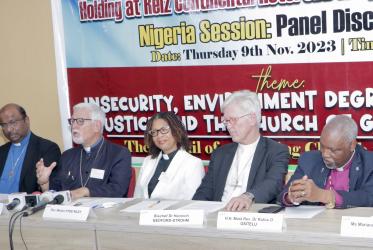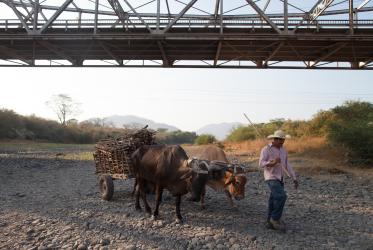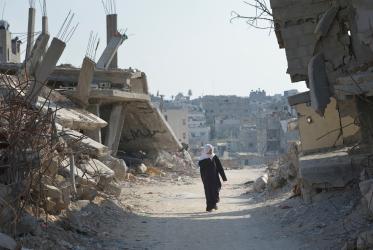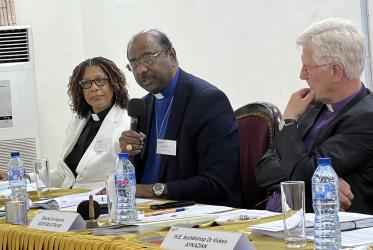Once again, may I reiterate a warm welcome to all of us. I really look forward to meeting face-to-face in June. This of course is basically an online meeting – and I’m grateful. As I was reflecting about this meeting, it just dawned in my mind that, as we move toward the assembly, we are perhaps in our last lap of our pilgrimage since Busan. To us, the 11th assembly comes at a time when a number of things have changed globally, nationally and even regionally. We will be hearing that also from the public issues committee.
Normally as runners do the last lap, they have three things in mind. One is they tend to focus on the pacesetters because their pacesetters enable them to finish. Two, they normally try to keep their energy for the last lap. The third thing is, if their pacesetters happen to overdo it, then they really get exhausted and sometimes the last lap is a disaster! Some don’t finish, some finish, and some complete the race fairly strong. So as we do our last lap, we need to see who have been our pacesetters on a number of issues. We have commissions, we have programmes and, indeed, how do we complete that part of the pilgrimage as we hand over to the next team? I think sometimes we get gripped by a spirit of fear and inaction. Fear is a very powerful issue and I was surprised that, in the Bible, 365 times fear is mentioned! That is to show how critical it is in the life of any human being.
Every day, I have to wrestle with the spirit of fear. And so we are reminded in this last lap not to be gripped by fear. There are many issues that could bring fear and so let us remember that fear is not God’s plan for us. We will overcome. Personally I was thinking some of us may be anxious, even afraid, of how the central committee will decide, whether we have enough mature ecumenicists and so forth and so on. But also the fear even that the global challenges we face, and these are challenges that are calling us as an ecumenical movement and as a council to order, which in my view help make the assembly theme even more relevant, that Christ’s love moves us to recondition and unity. The letter of James talks about trials and temptations, and that in times of trials and temptations, we should not be afraid. It is through trials and temptations that we actually can get new energy that we can be more strategic and renew. The whole notion of endurance becomes key in times of trials and temptations.
We have just talked a bit about the impact of COVID. We continue to reflect and share stories of resilience by communities and churches. We continue to share hope, aware of course of the spiritual, economic, and social challenges that the pandemic has actually raised, has created in many countries. We can remember people who have lost loved ones, some of them who are able to give farewells and some not. We remember many whose dignity has been devalued, the separation of families, the conflicts, the increased violence all over the place. And yet we celebrate the fact that the church of Christ, the Christian community has been there, compassionate for people in times of trouble. So we have seen new forms of witness to the gospel. As we travelled during this pilgrimage of justice in Italy, what we saw was many, many thousands of people on the streets. For me, and for us as a team, it was an indication that people are tired of being locked away. People wanted fellowship. Restaurants were packed. It was an interesting sign for me. They still insist on masks, wearing masks of course, but it was a very, very moving experience that the streets were full again. It is a sign of that compassion and love that people want to share with one another.
Our visit to Sudan was another area where we saw what the meaning of solidarity. The church of Sudan in the north is a minority. But at the same time, our visit in April together with the All Africa Conference of Churches, I found two things: 1) the need to constantly offer solidarity and a ministry of presence to the vulnerable, and 2) that sometimes the minority group is constantly faced with degradation. We were also moved by the fact that the churches in a minority status look at the council as a platform where they can meet, engage, and exchange. And so the whole solidarity, accompaniment, ministry of presence became so critical in this particular engagement. And I think many small communities actually look forward to our accompanying them in different contexts.
The visit to Italy was focused on migrants and refugees, and we saw the challenge of welcoming and receiving the migrant, the stranger. This Pilgrim Team Visit was encouraged by the way in which the church in Italy is offering compassion and support to these people. The ministry of the interior also has a much more positive approach, particularly for unaccompanied children. A couple of things came out critically, that in increasingly multi-faith, multicultural and multi-religious areas, the church needs to wrestle with transitions from mono-mono-mono to multi-multi-multi. The life of the church and the witness of the church is enhanced by these migrants. It is growing, it is livelier as they participate and engage in the life of the church in their new home.
Thirdly, sometimes migrants also need to feel that, in their new home, they can also speak and read the Bible in their own language. And so we saw a number of such small congregations. But the tragedy is inasmuch as such beautiful places, the beauty of the place was the brutality of death. Many, many die. And while the migrants and refugees separate from the community, in death they are united in the cemetery. The whole area of compassion and love is really cherished by these men and women, and children, and we are grateful to the church and the communities for offering their churches, and spaces to these people.
You will recollect we had a big workshop here at the beginning of this migration. Just listening to the various constituencies of migrants to the church, particularly that of member churches of the WCC, we need to rethink programmatically the place of migrants and refugees. It is a big issue. Churches in Germany have also invited us to consider migration as one of the critical issues informing the choice of Karlsruhe.
Climate justice of course remains a major concern. Some of these people were refugees because their countries are no longer sustainable. They are drying up every day, or they have a challenge getting clean water. As we walk together toward the assembly, what does economic justice mean? What does it mean when the military arms are now getting warm so they can be used and tested – and yet military arms are the cause of part of our economic injustice? Caring for creation is something that has come up. We have been working on it and we do need to see how it has come through the programmes and the Pilgrimage of Justice and Peace.
Another issue is food security – food and the human right to food remains. When we talk about the Ukraine-Russia war we probably do not even imagine that countries in Africa are affected because they either cannot access wheat or because there is no more wheat available. When they can’t access wheat because of the conflict, it’s really difficult.
Finally, we just came from the Katholikentag in Stuttgart. Our participation was necessary. There are a couple of things that we picked up that we will be discussing. One of the things that crossed our minds was how our welcoming team will be able to perform and that there will be more people interested in knowing about the life and the work of the church and people in Germany. Might it be possible to think of a tent where the information is available on a consistent basis?
Brothers and sisters, we could share a lot but you also have a lot to share with us! Our theme is very relevant in all programmatic and thematic areas. It is actually divine and people say yes, how do we concretize the theme so it does not remain at the academic top level? We are challenged not just to have plenaries but to ask ourselves, what does Christ’s love mean today? This is transpiring in your own churches and contexts. God bless us. Thank you.





